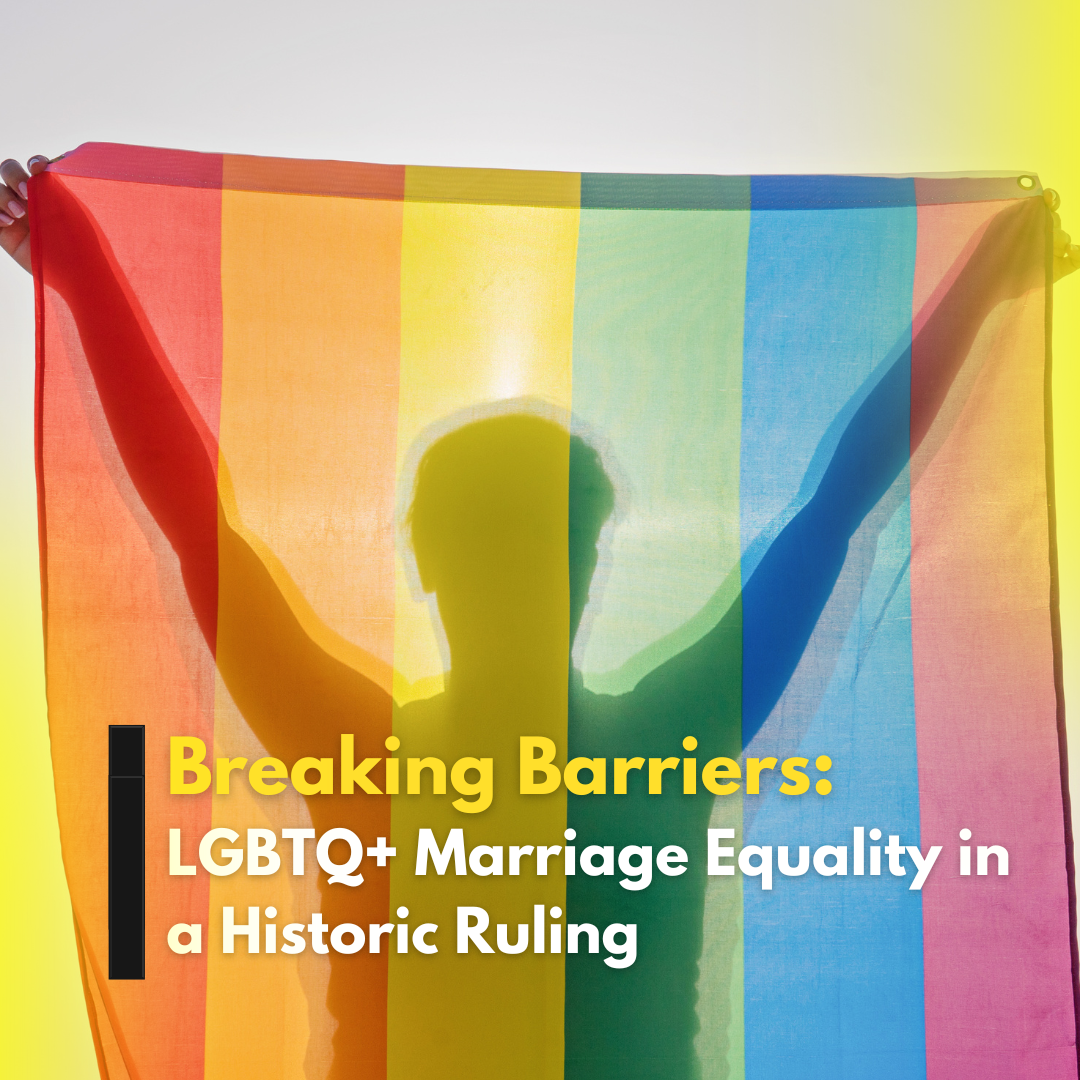Breaking Barriers: LGBTQ+ Marriage Equality in a Historic Ruling — India Supreme Court Weighing Down The Equality In Love As petitions seeking marriage equality move to the Supreme Court, the judiciary may soon determine whether Indian family law’s exclusion of relationships outside the male-female binary violates the constitutional rights of LGBTQ+ people. While constitutional arguments for marriage equality remain strong, within the LGBTQ+ community in India there are spirited debates on the pros and cons of the legal recognition of non-heterosexual relationships.
These debates raise several important concerns and must be taken seriously. But marriage equality remains important due to the significance of marriage in Indian society and its potential for positive social change. It could also open newer perspectives on marriage and broaden the possibilities of reform in other parts of family law. If recognised, marriage equality would become one of the most important family law reforms in a generation. We could break out of an impasse, where such reforms are portrayed as a Hobson’s choice between existing personal laws and a uniform civil code.
A man-woman affair
Existing family laws in India such as the secular Special Marriage Act (SMA) and Hindu personal law recognise marital relationships only within a male-female binary. This not only excludes same-sex couples but also transgender individuals whose relationships fall outside the binary. The Madras High Court, for instance, recognised as valid a marriage between a transwoman and a man, but that relationship recognition would not extend to transgender individuals marrying outside the male-female binary. Marriage equality would entail recognising the marital relationship between any two persons, including same-sex couples and transgender individuals.
The concerns regarding marriage equality can be classified into three broad buckets. First, marriage is seen as a flawed institution which is patriarchal and oppressive for women. The assimilation of LGBTQ+ relationships within the framework of formal legal marriage would contribute to the perpetuation of an already oppressive structure. Second, the focus on marriage equality ignores real-world concerns of LGBTQ+ people such as discrimination at the workplace, violence, and socio-economic vulnerability. Last, the legal focus on marriage equality disregards alternative family law possibilities beyond a two-person romantic union such as non-conjugal relationships and multi-parent families.
Within the LGBTQ+ community too, marriage an important aspiration […] Marriage remains an important public acknowledgement of love and commitment.
These are very important concerns and must give marriage equality advocates pause for thought. Yet, they do not take away the need for inclusion and legal recognition of LGBTQ+ relationships.
Marriage remains central to people’s lives in India. Almost two-thirds of India’s population of marriageable age are married. This is a very high number. Within the LGBTQ+ community too, marriage is an important aspiration. Several same-sex couples practice what has been termed as “social marriage” – ceremonies without legal consequences. Transgender individuals often seek to get their marriages registered.
This is because legal marriage confers benefits. It enables joint bank accounts, nominations for insurance and statutory compensation, and making healthcare and end-of-life decisions on behalf of one’s partner. Marriage remains an important public acknowledgement of love and commitment. It makes relationships socially legible – however imperfectly so.
Law and social change
The sheer complexity of Indian family law with the simultaneous co-existence of religious-identity-based personal law and secular law, and their inherent inter-connectedness, means that without eventual legislative interventions, a judicial decision might have only limited practical significance. Ultimately, the success of marriage equality would depend on inclusion in all aspects of family law such as parenthood and inheritance Yet, how the Supreme Court defines marriage equality and related family law rights can have important consequences.
The Supreme Court’s decisions on the decriminalisation of homosexuality and the recognition of transgender rights […] gave important legal tools to realise LGBTQ+ rights.
In India, law reform often does not follow social change but is often an instrument of social change. The Supreme Court’s decisions on the decriminalisation of homosexuality and the recognition of transgender rights are important examples. It is naive to think that these decisions would have erased years of discrimination and marginalisation and would have improved the lives of LGBTQ+ people overnight. Yet, the judgments gave important legal tools to realise LGBTQ+ rights.
Transgender rights litigation post-NALSA, even at the cost of inconsistencies in legal reasoning, has had largely positive outcomes in individual cases. Similarly, LGBTQ+ representation in popular culture post-these decisions has improved. As the scholar Alice Evans recently argued, positive representation of LGBTQ+ characters can go a long way in changing social attitudes. Moreover, these decisions enabled private enterprises to take a range of measures that recognise the relationships of LGBTQ+ persons and deliver them material benefits.
Even then, laws and rights remain imperfect tools to deliver social change. The Transgender Rights Act did not fully account for the concerns of the transgender community. Some of this stems from ingrained prejudices as well as a lack of state capacity. However, legal measures still force communities to mobilise, express their demands and contest them in the pursuit of better outcomes. Even critics of the Supreme Court’s gender and sexuality decisions would admit that they moved the needle on LGBTQ+ rights discourse and enabled newer conversations that were simply not possible before.
Advancing justice
The possibilities from marriage equality are endless. It could destabilise heterosexual and gender-unequal assumptions across family law. For instance, notice requirements in the SMA, marital remedies like the restitution of conjugal rights, and theories that disregard spousal contributions in determining economic maintenance post-divorce are destabilised by the recognition of non-heterosexual marriage.
This is not to say that the analysis of power between heterosexual and homosexual marriage should be equalised, but is merely to hint at the potential downstream consequences of marriage equality. Similarly, the possibility of marriage equality destabilises assumptions of parenthood as always being based on biological reproduction. This opens possibilities of parenthood outside the romantic conjugal two-person unit.
Advocacy for marriage equality does not have to come at the cost of other struggles […] each struggle can learn from the other in the pursuit of greater justice.
Issues such as discrimination at the workplace, violence, and socioeconomic vulnerability –including along axes of caste and religion – remain important concerns for the LGBTQ+ community. However, advocacy for marriage equality does not have to come at the cost of other struggles. Pursuing these objectives is not a zero-sum game. Rather, each struggle can learn from the other in the pursuit of greater justice.
Concerns that a focus on marriage comes at the cost of other non-normative relationships have also not played out as linearly as expected in jurisdictions that have already recognised marriage equality. For instance, scholars in the United States have shown how struggles for LGBTQ+ rights changed the meaning of marriage: from a patriarchal institution based on biological reproduction to a relationship centring companionship and mutual rights and obligations. Achieving marriage equality has had positive consequences for laws of parenthood as well.
While concerns regarding marriage equality must be taken seriously, it remains an important legal endeavour. It is a work in progress and not the end of the struggle for LGBTQ+ rights in India.
Article written by Akshat Agarwal
The information contained in this article was sourced from The India Forum
Link to original article: https://www.theindiaforum.in/law/case-legalising-lgbtq-marriages
Notes: apart from title change, the article has remained the same
-------------------------------










